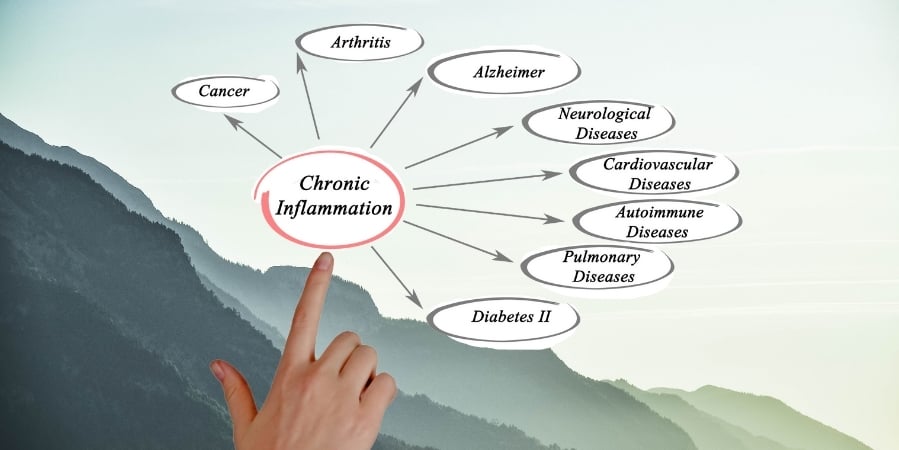What Is Inflammation?
Inflammation is your body's response to injury or infection. It is typically a normal and healthy part of your body's defense system whose purpose is to aid in the healing process.
However, chronic inflammation has been found to play a significant role in many chronic diseases.
This inflammation often contributes to the development and progression of disease. Chronic inflammation is often preventable and treatable through healthy diet and lifestyle choices.

What Causes Inflammation?
Many things in our modern environment contribute to the development of inflammation.
- Environmental chemicals, including air pollution, and, personal products (research is ongoing);
-
Nutrition including refined carbohydrates, alcohol, and processed foods (these factors damage the microbiota leading to intestinal and immune changes);
-
Unidentified food sensitivities;
-
Dysbiosis imbalance of the microbiome;
-
Social and cultural factors including poor sleep, stress, and lack of sunlight;
-
Bio individual factors including childhood obesity, microbes gained or lacking from infancy, genetics; and lack of physical activity.

How Does Chronic Inflammation Relate to Chronic Disease?
Scientific literature often mentions inflammation when discussing chronic disease. Inflammation has various roles in the development or progression of:
-
Autoimmune diseases such as rheumatoid arthritis;
-
Cardiovascular disease;
-
Gastrointestinal disorders like IBS and IBD;
-
Lung diseases such as asthma;
-
Mental illnesses like depression and anxiety;
-
Metabolic diseases such as type 2 diabetes;
-
Neurodegenerative diseases, for example, Parkinson's disease; and
-
Some cancers such as colon cancer.
Autoimmune Diseases
Autoimmune diseases are a sign that you have dysfunctional immune responses, which can result in uncontrolled chronic inflammation of otherwise healthy tissue.
This inflammation is thought to be triggered by factors such as genetics, environmental stimuli, and infection.
Some emerging scientific evidence is linking some microbiota organisms with the onset and progression of autoimmune and inflammatory diseases.
Some studies also emphasize that if you have an autoimmune disease, you most likely have dysbiosis or an imbalance of the microbiome.
Cardiovascular Diseases
Scientific studies have found the presence of macrophage and T-cells in plaque buildup, which suggests that the initiating and progressive factor for developing atherosclerosis is inflammation.
They've also found that if you have an autoimmune disease such as Rheumatoid Arthritis, then you are at twice the risk of developing cardiovascular disease.
If you're concerned about your risk you can now be tested for systemic inflammation, since this can be used to predict your chances of developing cardiovascular disease.

Gastrointestinal Disorders
Nowadays it may seem like most of us have some kind of mysterious, varying bowel issue from time to time.
Some of the more serious issues such as Inflammatory Bowel Disease (IBD), Crohn's, and ulcerative colitis have also been found to be caused by a dysregulated immune response to the microbiota like many autoimmune diseases.
If you're someone who suffers from IBD, research suggests that you are most likely deficient in anti-inflammatory microbes (Bacteroidetes, Faecalibacterium).
Also, there is likely an overabundance of inflammatory microbes (Proteobacteria and Ruminococcus).
Lung Diseases
Many of you have are frequently exposed to inflammatory, environmental factors such as cigarette smoke, air pollution, and allergens.
These can all cause lung and airway inflammation which can increase your chances of lung cancer and also be a dangerous trigger for those suffering from asthma or COPD (Chronic Obstructive Pulmonary Disease).
New scientific research is also linking asthma with an inflammatory imbalance of the microbiome.

Mental Illness
Several mental disorders are known to be associated with chronic inflammation. Researches have found that those diagnosed with depression and/or anxiety tend to eat a pro-inflammatory diet and have higher inflammatory markers.
Empirical evidence has also shown that Schizophrenia is correlated with chronic inflammation and can be triggered by a mix of genetics and environmental factors like an inflammatory trigger.
The severity of Schizophrenic symptoms can be influenced by dietary inflammation, and so anti-inflammatory nutrients such as Omega-3, and vitamins D, and B are being emphasized as beneficial additions to treatment.
Newer studies are also connecting peripheral and neuro inflammation to ADHD, which explains why symptoms often improve with the supplementation of anti-inflammatory omega-3s.
Neurodegenerative Diseases
Harvard.edu reports that 5 million of us Americans have been diagnosed with Alzheimer's, 1 million with Parkinson's, and 400,000 with multiple sclerosis.
It is increasingly understood that inflammation is a key player in these and other neurodegenerative diseases of the central nervous system.
Current research has identified that peripheral and neuro inflammation induces neuronal dysfunction and damage and that treatments with anti-inflammatories and antioxidant therapy can help prevent or delay onset.
Metabolic Diseases
According to the Centers for Disease Control and Prevention (CDC), over 42% of us living in the United States are obese.
This is bad news considering excess fat has been linked to the development of chronic inflammation, and chronic inflammation is associated with insulin resistance and type 2 diabetes, and both of these go on to create additional inflammation.
Carrying all this extra weight also puts you at risk for liver inflammation, which can lead to fatty liver and nonalcoholic steatohepatitis.
Cancer
I think it's fair to say that the majority of us have at least known someone who has or have personally experienced cancer and we can all agree that, "Cancer sucks!"
Well, inflammation plays a significant role in cancer, as well. Inflammation has been found to not only prompt the development of cancer, but it also advances all stages of tumor progression.
Chronic inflammation can cause abnormal cells because it inhibits the natural cell death of abnormal/mutated cells, which is called apoptosis.

11 Ways That You Can Reduce Your Inflammation
- 1.) Diets high in inflammatory foods have been linked to many chronic diseases, so avoid eating inflammatory foods such as:
- Refined starches including white bread, sugary cereals, and, white flour pasta;
- Sugar including candy, soda, pastries;
- Saturated and trans-fats including fatty and processed meats and processed foods such as 'fast food,' with ingredients including margarine, shortening, and packaged foods; and
- A typical western (sad) diet that is low in fiber and antioxidants.
- 2.) Eat an anti-inflammatory diet including foods such as:
- Foods high in antioxidants, polyphenols, and fiber;
- Plenty of colorful fruits and vegetables;
- Nuts including walnuts and almonds;
- Olive oil;
- Fatty fish including cod, wild-caught sockeye salmon, sardines;
- Seeds including chia seeds, hemp seeds, and flax seeds;
- Drinks high in antioxidants such as green tea and coffee; and
- Season or supplement with spices such as turmeric and ginger.
- 3.) Supplement with fiber such as from inulin, chicory root, and/or XOS (Xylooligosaccharides):
- The fermentation of these fibers by gut bacteria produces short-chain fatty acids, which act as an anti-inflammatory and also help rebalance the microbiome.
- 4.) Use toxin-free or "clean" personal care and makeup products.
- Try the "Think Dirty" app to help you find cleaner alternatives.
- 5.) Balance your microbiome by following the 4 Rs.
- 6.) Get quality sleep and plenty of sunlight (Vitamin D is anti-inflammatory).
- 7.) Reach or maintain a healthy weight.
- 8.) Get the recommended 150 minutes of moderate physical activity per week (physical activity produces anti-inflammatory proteins).
- 9.) Check for inflammatory food sensitivities through an elimination diet or an IgG blood test.
- 10.) Reduce your stress.
- Stress contributes to inflammation both directly and indirectly. For example, by interrupting anti-inflammatory processes such as sleep.
- Stress boosts proinflammatory gene expression.
- Stress can negatively influence your food choices.
- 11.) Supplement with Hemp oil:
- Studies overwhelmingly show that Hemp oil has multifaceted antioxidant and anti-inflammatory effects;
- In autoimmune, neural, and pulmonary studies researchers have taken an interest in the possibility of Hemp oil as a treatment for cancer;
- A study on the effects of Hemp oil on one of the most deadly forms of brain cancer (glioblastoma multiforme), revealed that Hemp oil has been shown to successfully induce cell death, inhibit cell migration and invasion in vitro, decrease tumor size, vascularization, growth, and weight, and increase survival and induce tumor regression in vivo." Source

Chronic diseases are largely preventable through diet and lifestyle choices. Are the choices you are currently making bringing you health or disease? It's never too late to make a change and if you need a little help in the right direction, feel free to contact us for a free 21-day meal plan!
Choosing a healthy plant-based and vegan diet is most beneficial when it comes to:
-
Higher levels of energy;
-
Improved sleep;

-
Aids in energy and overall happiness;
-
Provides a sense of comfort and relief;
-
Could prevent major diseases such as obesity and diabetes;
-
Accomplish weight-loss and management; and
-
Improves mental and cognitive functioning.
References
Atalay, S., Jarocka-Karpowicz, I., & Skrzydlewska, E. (2019). Antioxidative and Anti-Inflammatory Properties of Hemp Oil. Antioxidants (Basel, Switzerland), 9(1), 21. https://doi.org/10.3390/antiox9010021
Azab, M. (2018). The brain on fire: Depression and inflammation. Psychology Today, https://www.psychologytoday.com/us/blog/neuroscience-in-everyday-life/201810/the-brain-fire-depression-and-inflammation
Burns, G., Pryor, J., Holtmann, G., Walker, M. M., Talley, N. J., & Keely, S. (2019). Immune Activation in Functional Gastrointestinal Disorders. Gastroenterology & hepatology, 15(10), 539–548. https://www.ncbi.nlm.nih.gov/pmc/articles/PMC6883739/
Cha H.Y., Yang S.J. (2020). Anti-Inflammatory Diets and Schizophrenia. Clinical Nutrition Research, 9(4), 241-257. https://doi.org/10.7762/cnr.2020.9.4.241
Chitnis, T., & Weiner, H. L. (2017). CNS inflammation and neurodegeneration. The Journal of clinical investigation, 127(10), 3577–3587. https://doi.org/10.1172/JCI90609
Dunn, G. A., Nigg, J. T., & Sullivan, E. L. (2019). Neuroinflammation as a risk factor for attention deficit hyperactivity disorder. Pharmacology, biochemistry, and behavior, 182, 22–34. https://doi.org/10.1016/j.pbb.2019.05.005
Frati, F., Salvatori, C., Incorvaia, C., Bellucci, A., Di Cara, G., Marcucci, F., & Esposito, S. (2018). The Role of the Microbiome in Asthma: The Gut⁻Lung Axis. International journal of molecular sciences, 20(1), 123. https://doi.org/10.3390/ijms20010123
Greten, F. R., & Grivennikov, S. I. (2019). Inflammation and Cancer: Triggers, Mechanisms, and Consequences. Immunity, 51(1), 27–41. https://doi.org/10.1016/j.immuni.2019.06.025
https://www.health.harvard.edu/staying-healthy/foods-that-fight-inflammation
Kiecolt-Glaser J. K. (2010). Stress, food, and inflammation: psychoneuroimmunology and nutrition at the cutting edge. Psychosomatic medicine, 72(4), 365–369. https://doi.org/10.1097/PSY.0b013e3181dbf489
Korniluk, A., Koper, O., Kemona, H., & Dymicka-Piekarska, V. (2017). From inflammation to cancer. Irish Journal of medical science, 186(1), 57–62. https://doi.org/10.1007/s11845-016-1464-0
Lee, Y. S., & Olefsky, J. (2021). Chronic tissue inflammation and metabolic disease. Genes & development, 35(5-6), 307–328. https://doi.org/10.1101/gad.346312.120
Liu, Y. Z., Wang, Y. X., & Jiang, C. L. (2017). Inflammation: The Common Pathway of Stress-Related Diseases. Frontiers in human neuroscience, 11, 316. https://doi.org/10.3389/fnhum.2017.00316
Medical News Today https://www.medicalnewstoday.com/articles/anxiety-and-inflammation-is-there-a-link#Cause-or-effect?
Müller N. (2018). Inflammation in Schizophrenia: Pathogenetic Aspects and Therapeutic Considerations. Schizophrenia Bulletin, 44(5), 973–982. https://doi.org/10.1093/schbul/sby024
Murdoch, J. R., & Lloyd, C. M. (2010). Chronic inflammation and asthma. Mutation Research, 690(1-2), 24–39. https://doi.org/10.1016/j.mrfmmm.2009.09.005
Nichols, J. M., & Kaplan, B. (2020). Immune Responses Regulated by Hemp Research, 5(1), 12–31. https://doi.org/10.1089/can.2018.0073
Rakoff-Nahoum S. (2006). Why cancer and inflammation?. The Yale journal of biology and medicine, 79(3-4), 123–130. https://www.ncbi.nlm.nih.gov/pmc/articles/PMC1994795/
Seltzer, E. S., Watters, A. K., MacKenzie, D., Jr, Granat, L. M., & Zhang, D. (2020). (Hemp Oil) as a Promising Anti-Cancer Drug. Cancers, 12(11), 3203. https://doi.org/10.3390/cancers12113203
Tolkien, K., Bradburn, S., & Murgatroyd, C. (2018). An anti-inflammatory diet as a potential intervention for depressive disorders: A systematic review and meta-analysis. Clinical Nutrition, 38(15). DOI https://doi.org/10.1016/j.clnu.2018.11.007
Williams, L.M., Scott, H.A., Wood, L.G. (2019). Soluble fiber as a treatment for inflammation in asthma. Journal of Nutrition & Intermediary Metabolism, 18, https://doi.org/10.1016/j.jnim.2019.100108
Wu, W. H., Zegarra-Ruiz, D. F., & Diehl, G. E. (2020). Intestinal Microbes in Autoimmune and Inflammatory Disease. Frontiers in immunology, 11, 597966. https://doi.org/10.3389/fimmu.2020.597966
https://www.niehs.nih.gov/health/topics/conditions/inflammation/index.cfm
https://ntp.niehs.nih.gov/whatwestudy/tox21/index.html






















